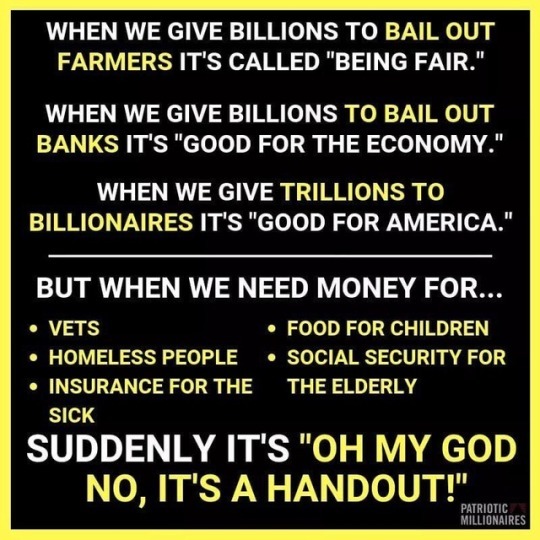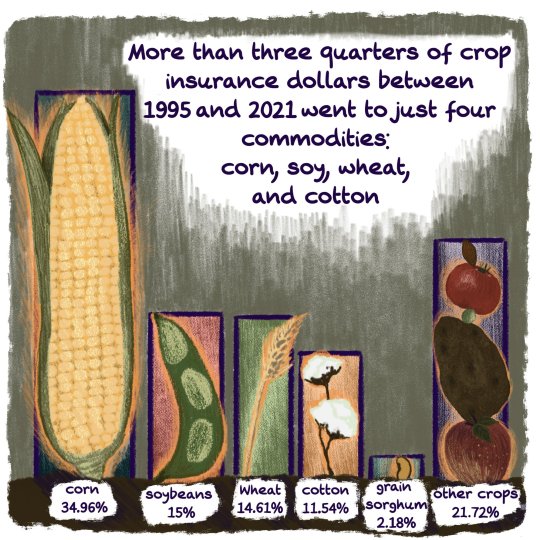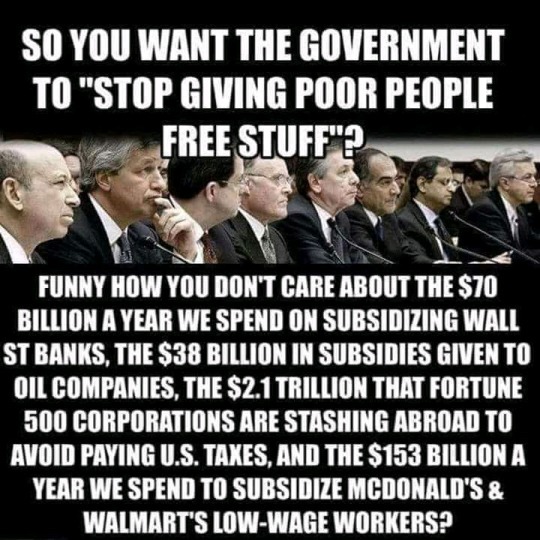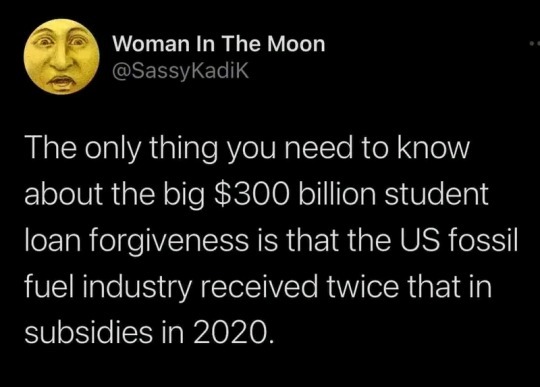#corporate subsidies
Text

Stop voting for Republicans who give your money to the top 1%.
#corporate welfare#corporate subsidies#corporate greed#republican assholes#never trump#traitor trump#crooked donald
2K notes
·
View notes
Text


3 notes
·
View notes
Text
#Climate Pollution#Corporate Subsidies#Corporate Profits#Environmental Protection Agency#Oil and Gas Industry#News
0 notes
Text

#stop voting for those fucking republicans#tax the rich#capitalism#late stage capitalism#corporate greed#republican assholes#traitor trump#crooked donald#maga morons#republican family values#unionize now#stop stock buybacks#increase minimum wage#end corporate subsidies#end corporate welfare
688 notes
·
View notes
Text
chicago hosting the DNC next year. the Brandon Administration (dark, federal) said

#why atlanta even think they could win#go back to playing with your corporate subsidies at the sunbelt table. the adults are talking
7 notes
·
View notes
Text
10 notes
·
View notes
Text
youtube
The Truth About Corporate Subsidies | Robert Reich
Robert Reich
Jan 10, 2023
Who else is sick of our government subsidizing the health care industry when millions can’t afford insurance, subsidizing Big Oil while they destroy the planet, and bailing out Wall Street when they crater our economy?
2 notes
·
View notes
Text
Holy fuck I regret reading an article about liz truss’ policies she is. Evil? Yeah evil that’s the word
#how to stop cost of living crisis? do you a) put energy tarif limits back in place#b) tax oil and gas profits and use that to subsidy bills#or c) cut corporation tax#if you answered c) then congrats! you could be the next Tory leader! you’re also an idiot!#uk politics#Liz truss
4 notes
·
View notes
Photo


the majority of [united states] government funding and taxpayer-backed programs in agriculture support corporate-controlled livestock and poultry operations and the production of grains (like corn and soybeans) to feed their animals
[x][x]
1 note
·
View note
Text
When is Capitalism Not Capitalism? - Kevin Carson, January 14th, 2016
-
As used by right-wing apologists for “free market capitalism” (an oxymoron if ever there was one), capitalism is the source of everything good in the world — but also something that never existed. And it switches repeatedly back and forth from one to the other, every couple of sentences, in the same argument. I learned this from interacting with the right-libertarians who’ve been using the “anticapitalists with iPhones LOL” meme to troll the #ResistCapitalism hashtag on social media.
I cited Arthur Chu’s observation that “Capitalism didn’t make your iPhone. Workers did. Capitalism just determines how the rents are distributed.” In response, someone said “Capitalism created the freedom that allowed people to invent the iPhone.” I pointed out to them all the ways that Apple’s profits from the iPhone depend on the use of the state to restrict freedom, both directly by using “intellectual property” to impede free cooperation and replication of technology outside their corporate framework, and indirectly through state subsidies to the offshoring of production to countries where workers are easier to exploit. The would-be defender of capitalism immediately piped up “What do subsidies have to do with capitalism? That sounds more like government to me.”
Aha. So the iPhone demonstrates the wonders and productivity of “free market capitalism,” but all the state-enforced monopolies, subsidies and other government intervention that Apple’s actual profit model depends on are “government.” Gotcha.
Sorry, but you can’t have it both ways. You can use “capitalism” as the name either for an idealized free market system that has never existed in practice, or for the actually existing historical system that you’re an apologist for. You can’t do both. If you start with the corporate capitalism that Apple is part of, and then take away the historical legacy (and ongoing process!) of peasant land enclosure, colonialism and neo-colonialism, slavery, land and resource grabs, “intellectual property” and other monopolies, and restrictions on the free movement and association of labor… well, you don’t have much left.
If you want to argue that “real capitalism has never existed,” and repeat “That’s not capitalism, that’s corporatism!” like a broken record, fine. But you can’t turn around then and use the products of a transnational corporation like Apple as an example of capitalism. If you do, you’re either stupid or a liar. It’s that simple.
And when you get right down to it, “capitalism” is a really bad term for a free market system. The word originated in the early 19th century as a name for the real-world historical system of capitalism, that emerged from the late Medieval economy from about 1500 or so on. And the state was absolutely integral to the emergence of that system of political economy, and to the form it took. It was a system in which the state actively intervened in the market, in all the ways (and more) I listed two paragraphs above, and did so on behalf of capitalists.
The use of “capitalism” by self-styled “free market” advocates only came later. It was a word that already had a long history — a history, in Marx’s words, written in letters of blood and fire — and was clearly identified with specific class interests. So when Mises and Rand chose that word, a word with those bloody associations and class identifications as their name for the “free market” — and named their ideal system after capital, one particular factor of production, at that! — you damn well better believe they had an agenda, and knew exactly what they were doing.
Corporate capitalism is not the free market, no more than was Soviet state communism. Both capitalism and state communism are coercive systems of power that parasitize on the creativity and cooperative labor of freely interacting human beings, so that those in power — whether CEOs and coupon-clippers or commissars — can live off the products of ordinary people’s efforts and ingenuity.
[source]
#free market#free market capitalism#capitalism#corporate capitalism#corporatism#labor#labour#arthur chu#kevin carson#c4ss#anticapitalism#subsidies#government#libertarianism#intellectual property#antistate#philosophy
0 notes
Video
youtube
The One Political Issue That Unites All of Us
#youtube#mr beat#mister beat#corporate welfare#politics#bribery#subsidies#tax breaks#influence peddling#corporate persondom
1 note
·
View note
Text
#Tax the rich#make the 1% pay their share#end corporate subsidies#end corporate welfare#billionaire tax#Republicans are owned by billionaires#oligarchs own GOP#corporate greed#republican party#never trump#republican assholes#traitor trump#crooked donald#republican hypocrisy#tax cheat Trump
21 notes
·
View notes
Text
It’s funny how Joe Biden giving corporate welfare to that micro-chip factory in New Mexico is somehow considered progressive amongst the establishment because it has daycare centers. It’s still corporate welfare!
It’s weird when reading establishment news sites to see how they consider these subsidies and command economyto be not only normal but somehow, intellectual. Like they have the hubris to dictate how things should be.
#subsidies#corporate welfare#micro-chip factory#new mexico#this command economy that biden has is very flawed#its even weirder how the establishment news considers this to be normal
1 note
·
View note
Link
Powering Nazimobiles
0 notes
Text

#tax the rich#end corporate welfare#end corporate subsidies#republican assholes#maga morons#traitor trump#crooked donald#resist#stop voting for fucking republicans
924 notes
·
View notes
Photo


How Corporate Welfare Hurts You
1 note
·
View note